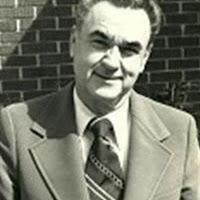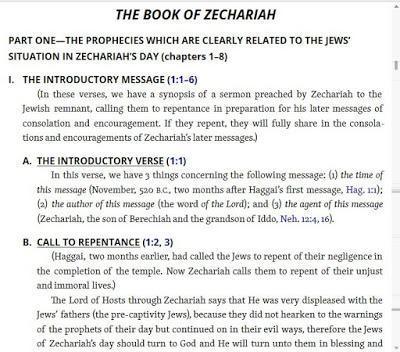
Dr Roy Gingrich, source Faithlife
We study the Bible because we love Jesus and want to know more about Him. The only place where we can reliably learn more about our Savior is in His word, which is THE authoritative word. We ladies like to learn theology, so we read God's word.I cut my teeth on the Old Testament, loving it from the beginning even as a babe in Christ. I spent the first years of my salvation reading all the Old Testament Prophets. They're hard, though, complicated at times and filled with symbolism, idioms, and long history which requires understanding for context. The Holy Spirit is the main help to us, because scripture teaches scripture. He illuminates the word to us as we study and pray. Psalm 119:18 says,
Open my eyes that I may see wonderful things in your law.
Ephesians 1:17-18 says
that the God of our Lord Jesus Christ, the Father of glory, may give you the Spirit of wisdom and of revelation in the knowledge of him, having the eyes of your hearts enlightened, that you may know what is the hope to which he has called you …
However, for information regarding the histories or interpretations of other difficult passages, we also use commentaries. God has raised up men before us who wrote down explanations and comments regarding the books of the Bible. In researching the book of Jeremiah, for example, I found few sermons, and fewer commentaries (which were available to me or reasonably priced enough to access).
Some people look down their noses at using commentaries, saying "I just use scripture." Really? you don't also listen to your pastor who stands there week after week explaining the scriptures to you? In his essay 20 Tips on How to Use Bible Commentaries, Professor and Pastor David Murray quotes Spurgeon,
It seems odd, that certain men who talk so much of what the Holy Spirit reveals to themselves, should think so little of what he has revealed to others. My chat this afternoon is not for these great originals, but for you who are content to learn of holy men, taught of God, and mighty in the Scriptures. It has been the fashion of late years to speak against the use of commentaries…A respectable acquaintance with the opinions of the giants of the past, might have saved many an erratic thinker from wild interpretations and outrageous inferences” (C H Spurgeon).The essay linked above with HOW to use commentaries, because there is a right way and a wrong way. Just as you study alone, you learn from your pastor, and listen to online sermons, definitely read commentaries also. Do use them.
On my Logos 6 software, I learned of a theologian called Roy Gingrich. I had not heard of him before and yet I was intrigued. He has commented on all the Bible and some Bible topics besides. He lived relatively recently and most of his writing was finished in the latter part of his life, in the 1970s to the '90s and even into the 2000s.
The bio at the Faithlife (Logos) wiki states,
Roy Gingrich was an American pastor and author best known for his comprehensive commentary series. He was born to Arthur and Arista Gingrich on February 3, 1920 in Ozark, Illinois, the youngest of four children. Roy received God’s call to enter the Christian ministry in 1941. After intensive preparation and pastoral stints in Illinois and Indiana, he became pastor of Faith Bible Church in Memphis, Tennessee, where he remained for over 40 years.
In 1963, Gingrich graduated cum laude from Victory University (formally Mid-South Bible College) and soon thereafter joined the teaching staff. Gingrich began writing conservative Bible commentaries in 1964. Roy Gingrich’s Commentaries in Outline Form (100 vols.) includes 60 different commentaries on the books of the Bible, and 40 additional commentaries on major Bible themes.
In 2001, Dr. Gingrich retired from a long and fruitful ministry, but continued to revise his commentaries and lecture at colleges and churches in the US. In 2003, he was inducted into the Crichton College Hall of Fame.Here is one revoew of one of the commentaries. Of Dr Gingrich's Commentary on Isaiah, fellow Professor of Theology Paul M. Davidson at Mid-South Bible College wrote in 1977 in the preface to Gingrich's Commentary on Isaiah,
The book of Isaiah is named for its author, the prophet Isaiah. Isaiah means “Jehovah is salvation” or “Salvation is of Jehovah.” He is rightly called “the Evangelical Prophet of the Old Testament.” By common consent, he ranks among the great literary geniuses of all time and his book is recognized as a part of the world’s great literature.
According to tradition, Isaiah was martyred, sawn asunder, Hebrews 11:37. Just so, in the hands of destructive modern critics his book has suffered, being cut up into many parts. Consequently, liberal Biblical scholars today deny the unity as well as the Isaiah an authorship of this great work. They affirm that it is the product of various authors, writing at different times, long after Isaiah’s death. Then an unknown redactor combined the various elements into the book that we know today as Isaiah.
In view of the above errors, it is refreshing to read Mr. Gingrich’s thoroughly orthodox, expanded, analytical outline of Isaiah. His exposition comes from a balanced and responsible conservatism which gives the work an abiding value. Like his other books, this one begins with a full general introduction, treating such topics as authorship, unity, historical background, importance, etc. This is followed by a succinct exegesis and explanation of the text. Both the layman and the busy preacher can use this commentary and quickly come to the heart of a passage and receive much help. For the greatest profit, this outline should be both read and studied with an open Bible. It is designed for both personal and group use.
For many years, Mr. Roy Gingrich has been pastor of Faith Bible Church, Memphis, Tennessee. He is a graduate of Mid-South Bible College, where he is presently a much loved and respected professor. He is truly a humble man of God and a diligent, tireless student of the Word. The reader of these pages has before him the fruit of many hours of prayerful research and the insights of six or seven of the most outstanding and scholarly commentaries on Isaiah.
Heartily and without reservation, I encourage pastors, teachers, and lay persons desiring a thorough grasp of Isaiah to study carefully this analytical outline, this outline being an interesting and effective aid to an understanding of this portion of the Scriptures.The really interesting thing about Dr Gingrich's approach to writing commentaries, is that they are all outlines. I love me some Matthew Henry but in accessing his Whole Commentary on the Bible through Logos, sometimes it takes me a long time of reading before I get to the single nugget I want. Mr Gingrich wrote all his commentaries, including the Prophets, as an outline, with a one or two clear, concise sentences for each verse. It's very helpful. Here is an example of a page from his commentary on Zechariah.

I have not read all of his commentaries, obviously. Just last night I completed downloading the final commentary on the major and minor prophets, to that end, my set is now complete. I've enjoyed what I've read so far of Dr Gingrich's work and I especially love he outline form. They are great for small group, too. If you are looking for an alternative to long, complicated commentaries which seem to be orthodox and best of all, affordable, please consider Dr Gingrich's outlines. They have proved invaluable.
Most of his outlines are available as a download through Logos 6 or Kindle or other method. There are paperback copies available through Amazon also.
Available from RoyGingrich.com
Available at Amazon
------------------------------------
Further Reading
20 Tips on How To Use Bible Commentaries
